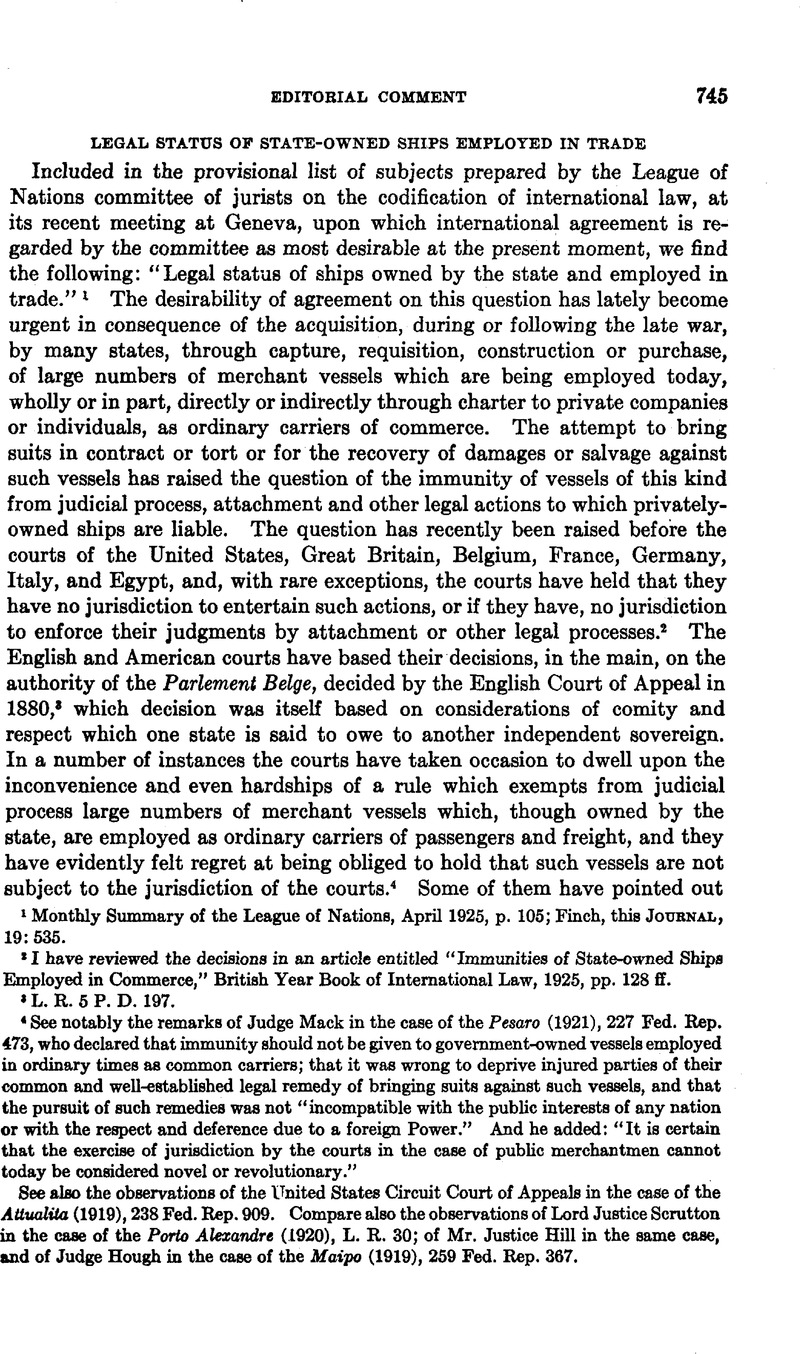Published online by Cambridge University Press: 04 May 2017

1 Monthly Summary of the League of Nations, April 1925, p. 105;Google Scholar Finch, this Journal,19: 535.
2 I have reviewed the decisions in an article entitled “Immunities of State-owned Ships Employed in Commerce,” British Year Book of International Law, 1925, pp. 128 ff.Google Scholar
3 L. R. 5 P. D. 197.
4 See notably the remarks of Judge Mack in the case of the Pesaro (1921), 227 Fed. Rep. 473, who declared that immunity should not be given to government-owned vessels employed in ordinary times as common carriers; that it was wrong to deprive injured parties of their common and well-established legal remedy of bringing suits against such vessels, and that the pursuit of such remedies was not “incompatible with the public interests of any nation or with the respect and deference due to a foreign Power.” and he added: “It is certain that the exercise of jurisdiction by the courts in the case of public merchantmen cannot today be considered novel or revolutionary.”
See also the observations of the United States Circuit Court of Appeals in the case of the Attualita (1919), 238 Fed. Rep. 909. Compare also the observations of Lord Justice Scrutton in the case of the Porto Alexandre (1920), L. R. 30; of Mr. Justice Hill in the same case, and of Judge Hough in the case of the Maipo (1919), 259 Fed. Rep. 367.
5 L. E. 4 Adm. and Ecc. 59.
6 93 Law Journal Reports, 816.
7 See the remarks of Judge Mayer in the Maipo (1918) 252 Fed. Rep. 627, to the effect that the decision in the Charkieh case has been overruled.
8 31 Clunet (1904), 417. But the Belgian court, while asserting jurisdiction over state-owned vessels engaged in ordinary commerce and entering judgments for damages against them in certain cases, declined to go further and issue a saisie conservatoire or writ of attachment to compel the payment of the judgment. See the cases cited by Rippert in 34 Rev. Int. du Droit Maritime, p. 20. The French courts adopted the same procedure in several cases involving suits against American Shipping Board vessels. See the cases of the Engle-wood, the Hungerford and the Glenridge, 32 ibid. (1920–21), 345, 599, and 602; 33 ibid., 763; 46 Clunet, 747, and 47 Clunet, 621.
9 15 Clunet (1888), 289 and an article by Gabba, 15 ibid., 180 ff.
10 Case of the Sumatra. Text of the decision in 33 Rev. Int. du Droit Maritime, 167. See also the decision of the Egyptian Court of Appeal (1912), 24 Bui. Aegypt. de Leg. et de Jurispru., 330.Google Scholar
11 Instruction of the Department of State of March 5, 1924, to American diplomatic officials accredited to maritime Powers. Released to the press April 19.
12 Compare in this sense Nielsen “Law and Practice of States with Regard to Merchant Vessels,” this Journal, Vol. 13, pp. 17 ff.;Google Scholar Walton, “State Immunity in the Laws of England, France, Italy and Belgium,” Jour, of Soc. Comp. Leg. Ser. 3 (1920), Vol. II, pp. 252 ff., Rippert, 34 Rev. Int. du Droit Maritime, pp. 17 ff.;Google Scholar von Bar, Rapport, in 11 Annuaire de I'Insl. de Droit Int. 414 ff.;Google Scholar Despagnet, Droit Int. Privi, Sec. 179;Google Scholar Weiss, TraiUde Droit Int. Privi, Vol. V. pp. 87 ff.;Google Scholar and Matsunami, Immunity of State Ships (1924).Google Scholar Compa.re also the Draft International Regulations on the Competence of Courts in Suits against For eign States, Sovereigns or Heads of States (1891), Resolutions of the Institute of International Law, p. 91;Google Scholar and the resolutions of the International Maritime Committee adopted at its recent conferences at London and Gothenburg.